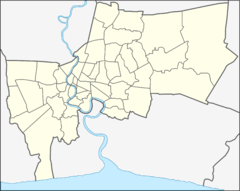Wat Mahathat Yuwaratrangsarit
Wat Mahathat Yuwaratrangsarit (Thai: วัดมหาธาตุยุวราชรังสฤษฎิ์) is a Buddhist temple located in Bangkok, Thailand. It is one of Bangkok's ten royal temples of the highest class (Thai: พระอารามหลวง ชั้นเอก ชนิดราชวรมหาวิหาร).[1]
| Wat Mahathat Yuwaratrangsarit | |
|---|---|
วัดมหาธาตุยุวราชรังสฤษฎิ์ | |
 | |
| Religion | |
| Affiliation | Buddhism |
| Sect | Theravāda |
| Leadership | Phra Phromwachirathibodi (abbot) |
| Location | |
| Geographic coordinates | 13°45′18″N 100°29′27″E / 13.75500°N 100.49083°E |
History
changeThe temple was built during the Ayutthaya era (1351-1767) and was known as Wat Salak. It was designed to function as a royal monastery. The temple was designed by Prince Mongkut, who later became King Rama IV. It has been renovated and expanded multiple times throughout the years, including architectural and structural modifications. These developments have contributed to sustaining its significance as a significant religious site in Thailand.[2]
Architecture
changeIt follows the architectural style of ancient Thai temples. The temple includes several buildings and structures, such as a major prayer hall, pagodas, meditation halls, and monks' dormitories. One of the temple's most remarkable attractions is the central pagoda, or stupa, containing Buddha remains. The pagoda is decorated with intricate designs and ornamental embellishments that showcase Thai artists' expertise.
Religious Importance
changeIt serves as a religious gathering place, with daily prayers, meditation sessions, and Buddhist rituals. The temple is important in Thai society and culture, holding a variety of cultural events and festivals year-round. These activities draw residents and foreigners, adding to the temple's status as a cultural monument in Bangkok.
Tourism
changeIt is a major tourist site in Bangkok, attracting tourists from all over the world who discover the beauty of the architecture, learn about Thai Buddhism, and enjoy the peaceful surroundings of the area around the temple. Visitors to the temple can explore its several buildings and structures and take part in guided tours and cultural programs offered by the temple administration.
Gallery
change-
Buddha idols along a walkway
-
Wat Mahathat temple building
-
Pagoda
-
Mahachulalongkornrajavi-dyalaya University
-
Temple roof
-
Thai PM at the time, Phibul (centre), joining the graduation ceremony of the Mahachulalongkornrajavidyalaya's first class.
